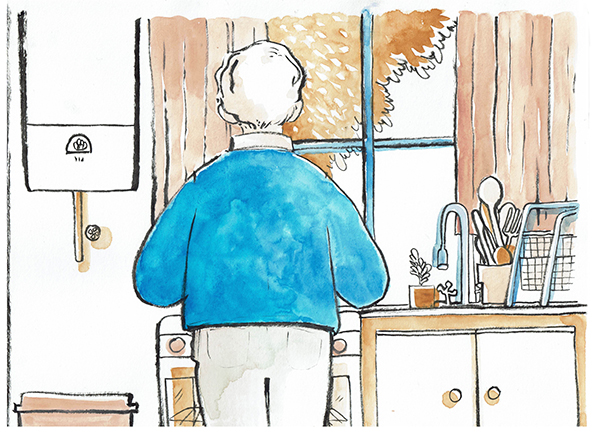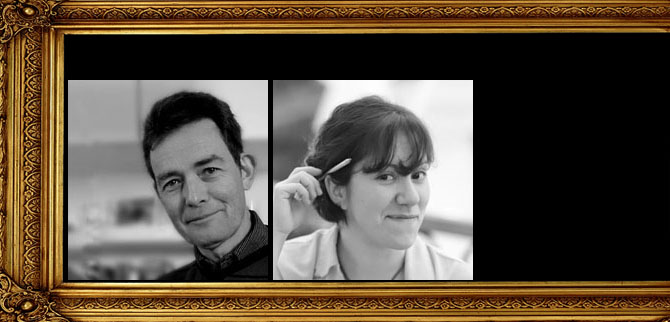Carolina Medina, Exhibition, Chilean Embassy Dublin, 27th September 2019
The only writers or artists who have ever interested me have been the ones who speak about death, in other words, whose work, or art, is primarily concerned with mortality, or to put it another way, whose art attempts to explore what it means to be mortal.
Carolina Medina is such an artist.
Her current exhibition, images taken from her latest book, concern the relationship which she had with her father while she was growing up as a girl in her native Chile. In it she treats his subsequent death, and how she has been trying to come to terms with this traumatic life altering event.
Like Marcel Proust, who believed in working only with the assorted phenomenon of involuntary memory, Medina creates key images from her past which become emblematic, metaphorical images, and when they are exhibited together, or printed page to page in a book, they form the edifice, or monument, that is her art.
For example, take the image of the overloaded ashtray smoking away like Vesuvius, full of half-spent or smouldering cigarette butts, which become a totemic image of her father who was a habitual smoker, and who eventually died of cancer. So, just as the Madelene infused in the tea became the involuntary aroma which, when noticed by the narrator in Du côté de chez Swann, suddenly evokes all of the mysteries of Combray, in Normandy where he spent his time during his childhood with his family, so too for Medina can the pungent odour of a certain tobacco, or cigarette smoke, trigger in her times spent in her family home with her father and family back in Chile.

Samuel Beckett identifies eleven ‘fetishes’ or ‘Proustian revelations’ in the epic 8 volumes of La recherche de temps perdu which are key moments in the mammoth project which act as catalysts for the work as a whole. Looking around the walls of the Chilean embassy in Dublin today, as spectators, we too are privy to a rich kaleidoscope of images from Medina’s now mythological past. We can see the avatars which have surfaced, through her art she has managed to salvage them; the orange Mercedes which her father drove, it appears upon the wall as evocative as the deer once painted on the cave walls of Lascaux. As does the frying pan, another scared object; her father used to cook for the family when he came home from work…
Presence in absence, or absence in presence? Which would you prefer to suffer, given a choice? The former would indicate such a presence in a former life that it remains like an indelible stain upon the mind of the host, so that their waking lives are assailed continuously by the ghost-like phantoms of the absent – in the case of Medina her father. We all have these phantoms, if we are ‘lucky’!
Such is LIVING. An exercise in ontology. Be-ING! As opposed to appearing to be. The latter being a particularly Irish feature, evoking Berkeley. We ‘are’ only because we witness one another, act as references to one other. A hall of mirrors. All then being surface. Superficial. A world of mere appearances. Nietzsche, Wilde and Yeats acknowledge this world of masks which the young Rimbaud, so brilliantly evoked here by Medina, attempted to burst through by colouring the vowels through the systematic dérèglement de tous les sens.
Oisive jeunesse
A tout asservie,
Par délicatesse
J’ai perdue ma vie.
Dublin based illustrator Carolina Medina, Crayolina, originally an American and English literature teacher, has been developing her image-making skills for the past three years, bringing about a perfect marriage of her two passions. A principal theme in Carolina’s work is the nature of time and her writing, through visual storytelling approaches. With two fantasy novels and several exhibitions in Chile, her native country, Carolina’s use of traditional techniques being acrylic, gouache and pencil drawing, are about to acquire a major expansion after enrolling in a three years BA in Graphic Design in Dublin.
Peter O’Neill is the author of several books, most recently More Micks Than Dicks, a hybrid Beckettian novella in 3 genres currently out of print, and The Dublin Trilogy: Poems & Transversions 1992-2017, a singular engagement with a 19th century French Master; launched in Paris in November last year to commemorate the 150th anniversary of Baudelaire’s death. He recently presented je la dis comme elle vientv – The Appearance of the Homeric Muse in Beckett’s Comment c’est/How It Is at the How It Is Symposium organised by Gare Saint Lazare Players Ireland at the Centre Culturel Irlandais in Paris. He teaches EFL and resides in Dublin.
© Peter O’Neill


